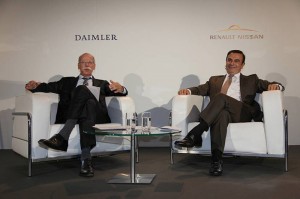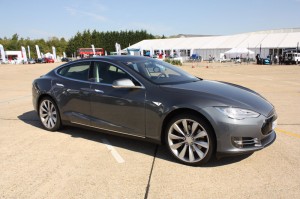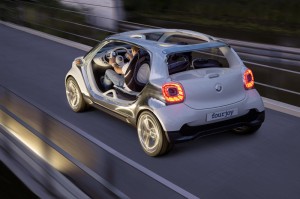After listening to the Renault-Nissan and Daimler press conference (with Carlos Ghosn and Dieter Zetsche respectively) it is clear that the two (or is that three) companies are helping each other in many open and collaborative ways.

Most interestingly to us here at AutoVolt Magazine, is when they were asked the question whether there were any conflicts of interest with respect to electric cars – more specifically – Daimler helped Tesla Motors who’re now pushing their Model S luxury saloon car across Europe.
The answer was very open and honest and makes a good point about electric cars in general. Answering the floor, Carlos Ghosn replied quite simply by stating that there was no conflict of interest as, actually, Renault-Nissan benefits from other manufacturers producing electric cars. The reason for this surprising reply? Simple: More electric cars being sold means more people backing them and [hopefully] more sales of them as a result. The net result would be to successfully instill the fact that electric cars are no longer a novelty, but instead a practical means of transport for the majority of populations worldwide.

The realisation that electric cars are here to stay is yet to come from most of the general populous, let alone automotive journalists. Fortunately, perhaps as a result of cars such as the Tesla Model S, many auto journalists are coming around to the idea of electric and hybrid vehicles. In part, due to the fact they’ve little other choice nowadays with almost every single manufacturer pushing either an economical car, a hybrid or an electric vehicle. At long last, some have started to notice the merits of electric cars, excellent power at any speed, refinement and a near silent ride to name but a few.
Certainly the main focus of the IAA Frankfurt motor show for most exhibitors is sustainability or a derivation of the word and subject, meaning hybrid and electric cars are taking centre stage.
Back to the press conference then, both Mr Ghosn and Mr Zetsche agreed their two companies are deeply integrated with a certain number of future electric car projects. The fact Daimler has helped Tesla, will in turn help Renault-Nissan and the fact Renault-Nissan group is leading the way with electric cars on a global scale will in turn help Daimler.
To give an example of a specific project, both Daimler with the Smart car brand and Renault with the Twingo model are working together on the next iteration, due to be released in 2014. The collaborative approach means that the next four seat Smart will likely share the same platform (at least) as the next Renault Twingo.

Given Renault’s love for electric cars and the fact that smart has produced the ‘fourjoy’ all electric concept car (for four people), it is a distinct possibility that the next Renault Twingo will either be solely electric, or have an all electric variant as an option.
Either way, both the current electric smart ‘fortwo’ and Renault Zoe (and other Renault EVs) are great fun to drive, refined and feature excellent handling about town in particular so whatever the collaboration between the Renault-Nissan group and Daimler brings, it will certainly be interesting.
You can read all about the smart fourjoy electric concept car here.
